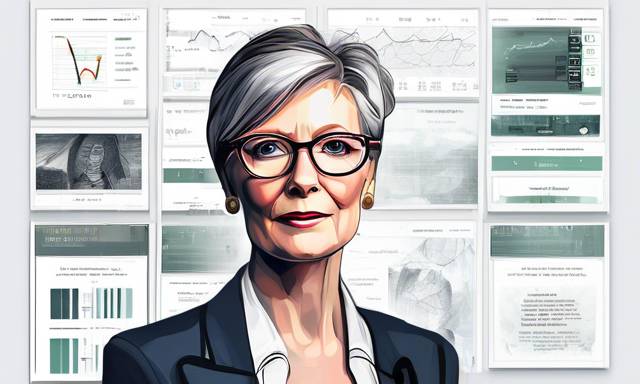Insights from Cathie Wood on Economic Trends and Innovations 📈
Cathie Wood, the visionary CEO and Co-Founder of ARK Investment Management, shares her analysis of current economic shifts and innovative trends. Her recent discussion on “Bloomberg The Close” on October 4 elucidates the implications of Federal Reserve policies and highlights critical observations regarding employment and sector performance. This year, Wood emphasizes the potential for deflationary aspects driven by innovation and consumer behavior, and she discusses how these trends may shape the market environment.
Federal Reserve Decisions and Economic Activity 🏦
During her interview, Wood stated that the Federal Reserve’s decision to cut interest rates was a significant move, not an error. She has been closely monitoring changes in economic dynamics, especially the unexpectedly low employment figures, which have seen a downward revision from initially reported numbers.
She pointed out that while examining financial results, many firms are experiencing declining revenues. Moreover, she highlighted that the recent increases in personal income figures have been heavily skewed by governmental transfers and dividends, rather than organic growth.
Economic Sectors in Decline 📉
Wood shared her concerns about the broader economic landscape, noting that various sectors are slipping into recession, contrary to what the surface data may indicate. For instance:
- Housing Market: Experienced a drastic dip of 20% to 40% following the Fed’s rate hikes.
- Non-residential Construction: Currently in a downturn.
- Automotive Industry: Displaying significant weakness.
These trends raise red flags about the health of the cyclical economy.
Employment Data and Economic Confidence 📊
When discussing employment, Wood responded to the latest payroll report indicating an addition of 254,000 jobs in September. She expressed her desire to elaborate on her earlier arguments about ongoing recessions across various sectors, particularly affecting small and medium-sized enterprises. Her observations suggest that current confidence levels among these businesses mirror those observed during the 2008-2009 financial downturn.
Price Dynamics and Consumer Behavior 🛒
Wood believes that a decline in pricing and better deals for consumers are encouraging ongoing economic activities. Many assert that real growth leads to inflation; however, Wood argues that price cuts historically drive more engagement in the economy. She maintains optimism as the job market remains steady and companies such as Walmart and Costco are lowering prices and enhancing discounts.
Yet, she cautions that attempts to increase prices could negatively impact sales, giving FedEx as an example—its revenue growth turned negative after raising prices.
Anticipated Deflationary Trends 🔍
Wood asserts that the signs of deflation will likely become more pronounced in the coming year. Notably, she views deflation not necessarily as a negative phenomenon; it can stem from innovative advancements, particularly in technology. She cited decreasing prices and production expenses for electric vehicles as an illustration, arguing that robust productivity enables companies to lower prices while safeguarding their profit margins.
Inflation Predictions and Job Market Expectations 💰
When queried about the possibility of inflation turning negative alongside rising unemployment rates, Wood acknowledged her expectations have shifted. Even though inflation has remained around 3.5% to 4%, it has recently dipped below 3%. Companies are increasingly working to draw in consumers through competitive pricing, which Wood believes will further reduce inflationary pressures.
The Role of Regulation in Innovation ⚖️
Turning to political matters, Wood shared that ARK’s primary interest revolves around innovation. She expressed concerns regarding stringent regulations pushing innovation out of the United States, particularly affecting the cryptocurrency and digital asset sectors. Regulators, including the SEC and FTC, have often appeared unsupportive, blocking valid pathways for innovative firms chasing mergers and acquisitions.
Wood welcomes the emerging bipartisan focus on fostering innovation and remains hopeful about potential changes in regulatory leadership, which could work in favor of the technological sector.
Investment Strategies on Emerging Technologies 🧪
Wood elaborated on ARK’s strategy involving artificial intelligence, referencing OpenAI’s substantial funding round that raised its valuation to $157 billion. ARK has invested significantly, demonstrating a long-term commitment to researching AI trends. Although some stakes like Nvidia have been reduced, the search for new growth opportunities, especially in software development, remains a key focus.
Among her notable investments are Palantir and UiPath. While many intriguing software companies remain privately held, ARK offers access to some ventures like OpenAI and SpaceX through its venture fund, encouraging wider participation from investors.
Looking Ahead: Market Observations 🚀
Discussing past decisions, Wood reflected on transitioning from Nvidia to Coinbase. Notably, she acknowledged that Nvidia’s stock has performed better since that time, but argued the importance of focusing on future growth potential in software. She remains open to reinvesting in Nvidia if its price aligns favorably.
Final Thoughts on Market Dynamics 🔮
In conclusion, Wood highlights Tesla’s ambitious AI initiatives, projecting significant future valuations influenced by advancements in autonomous mobility. Her insights suggest that innovation will continue to drive market transformations in the coming years, and close attention to these developments may yield noteworthy implications for various sectors.





 By
By
 By
By

 By
By
